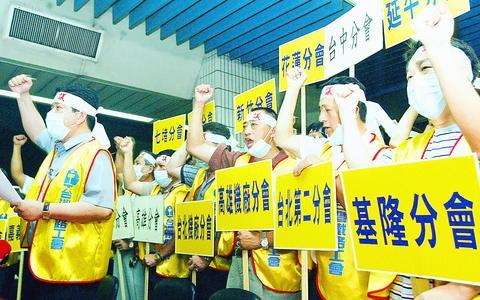The Taiwan Railway Labor Union (TRLU) yesterday vowed to launch a massive members' conference on Sept. 11 to protest what it says is the government's sacrificing of the 115-year-old railway enterprise to the benefit of the nation's north-south high-speed railway.
Sept. 11 is the date of the Mid-Autumn Festival and the union called for travelers to use other means of transportation to return home for the holiday, so that the union's move would not affect them.

PHOTO: CNA
Union chairman Chang Wen-cheng (張文正) said that about 14,000 railway workers will attend the September conference to discuss a strike during next year's Lunar New Year holidays.
As a significant number of railway workers will be attending the conference, the union apologized to the public yesterday for the inconvenience it may cause them.
Some trains are expected to be cancelled because of the high number of railway workers that will take leave to join the conference.
"We decided to do so because we had no other choice. We have the right to seek a way to survive," the union said.
Union members gathered on a platform at the Taipei Railway Station yesterday afternoon to announce their decision.
The traditional railway system under the Taiwan Railway Administration (TRA) faces two grave challenges: settling its disputes with the Taiwan High Speed Rail Corp (THSRC) and the government's plan to turn the TRA into a corporation.
The union's grievances against the THSRC, the company constructing the north-south railway, first emerged when the government asked the TRA to share Taipei Railway Station's platforms, tracks and tunnels with the THSRC.
The union alleged that the Ministry of Transportation and Communications apparently favored the THSRC when negotiating between the TRA and the THSRC about the distribution of Taipei Railway Station's platforms and tracks.
TRA deputy director Hsu Ta-wen (
"If the government can manage to meet the union's demands, its members will not need to hold the conference in September," was Hu's only response.
Viewing the completion of the high-speed railway as a serious threat to the survival of the traditional railway system, the union has launched a number of protests over the past three years, all without avail.
The high-speed railway, with its trains designed to travel at a speed of more than 300kph, will effectively cut the traveling time between Taipei and Kaohsiung to 90 minutes.
In contrast, the fastest trains currently provided by the TRA take at least four to five hours to travel between the two cities.
The union said workers of the deficit-burdened traditional railway enterprise are facing job losses because the government plans to revitalize the traditional railway, partly by axing jobs and reducing salaries.
Accusing the government of ignoring their pleas to secure proper operation of the traditional railway while the high-speed railway is under construction, the union has been staging protests against construction of the new railway since 2001.

Alain Robert, known as the "French Spider-Man," praised Alex Honnold as exceptionally well-prepared after the US climber completed a free solo ascent of Taipei 101 yesterday. Robert said Honnold's ascent of the 508m-tall skyscraper in just more than one-and-a-half hours without using safety ropes or equipment was a remarkable achievement. "This is my life," he said in an interview conducted in French, adding that he liked the feeling of being "on the edge of danger." The 63-year-old Frenchman climbed Taipei 101 using ropes in December 2004, taking about four hours to reach the top. On a one-to-10 scale of difficulty, Robert said Taipei 101

Nipah virus infection is to be officially listed as a category 5 notifiable infectious disease in Taiwan in March, while clinical treatment guidelines are being formulated, the Centers for Disease Control (CDC) said yesterday. With Nipah infections being reported in other countries and considering its relatively high fatality rate, the centers on Jan. 16 announced that it would be listed as a notifiable infectious disease to bolster the nation’s systematic early warning system and increase public awareness, the CDC said. Bangladesh reported four fatal cases last year in separate districts, with three linked to raw date palm sap consumption, CDC Epidemic Intelligence

US climber Alex Honnold left Taiwan this morning a day after completing a free-solo ascent of Taipei 101, a feat that drew cheers from onlookers and gained widespread international attention. Honnold yesterday scaled the 101-story skyscraper without a rope or safety harness. The climb — the highest urban free-solo ascent ever attempted — took just more than 90 minutes and was streamed live on Netflix. It was covered by major international news outlets including CNN, the New York Times, the Guardian and the Wall Street Journal. As Honnold prepared to leave Taiwan today, he attracted a crowd when he and his wife, Sanni,

Two Taiwanese prosecutors were questioned by Chinese security personnel at their hotel during a trip to China’s Henan Province this month, the Mainland Affairs Council (MAC) said yesterday. The officers had personal information on the prosecutors, including “when they were assigned to their posts, their work locations and job titles,” MAC Deputy Minister and spokesman Liang Wen-chieh (梁文傑) said. On top of asking about their agencies and positions, the officers also questioned the prosecutors about the Cross-Strait Joint Crime-Fighting and Judicial Mutual Assistance Agreement, a pact that serves as the framework for Taiwan-China cooperation on combating crime and providing judicial assistance, Liang